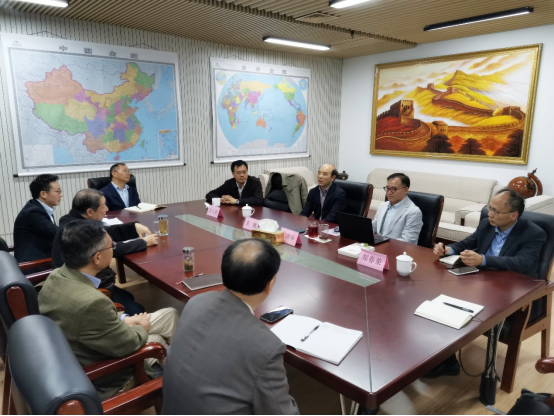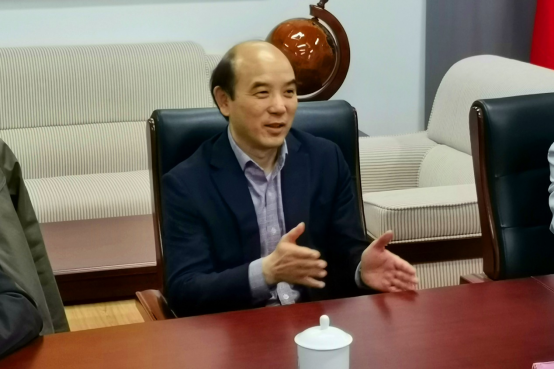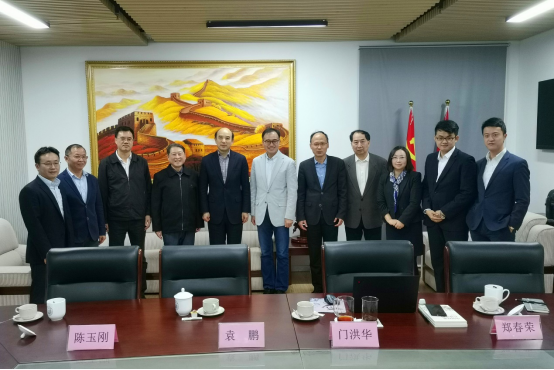News




On November 12, 2019, Professor Yuan Peng, President of China Institutes of Contemporary International Relations (CICIR), was invited to visit our school, where he had academic exchange with a dozen of teachers and students to share his professional understanding of China-US relations and discuss the possible direction of China’s policy towards the US. Dean Men Honghua, Tongji Distinguished Professor and President of the Institute for China & World Studies of Tongji University, attended and moderated the academic seminar. Prof. Yuan was accompanied by Prof. Chen Yugang, Executive Deputy Head of the Publicity Department of the Party Committee of Fudan University.
Prof. Yuan began with a comparison between the academic research in universities and the policy suggestions by think tanks, followed by a basic understanding of the recent China-US trade friction, that is, this is a strategic alternative based on structural changes in China-US relations. Then, he systematically explained the three root causes of such changes: (1) Changes in the comparison of strength. As China is becoming a peer competitor to the US in terms of economy, China's peaceful rise has been accepted by many Americans. (2) Changes in strategic layout. At present, the US is increasingly uncomfortable with China's global strategy, believing that China's strategic choices have caused changes in China-US relations. (3) Changes in the basis for cooperation. It is difficult to find a proper point to support the current China-US relations, leading to a negative misunderstanding by the US of China's strategic design. Based on the above understanding, Prof. Yuan continued to explain the strategic considerations of the US on the China-US trade war. According to the professor’s analysis, the US has orchestrated to strike a blow on China without meeting on the battleground, which is a strategic experiment based on the domestic bipartisan consensus and the demands of the general electorate as well as the partial recognition in the international community. Actually, the trade war is started by the US to attack China’s high-tech industry and its development model. In response, China should maintain an attitude of “standing ready to talk, but not being afraid of a trade war” and uphold the “struggling spirit” emphasized by General Secretary Xi Jinping, to bring the Trump administration back to the negotiating table.

China’s national strategy has achieved positive results at this level, but we must continue to monitor the US strategic interference in the cross-Straits relations, ideology, and South China Sea issues, especially to further control the high-risk period of China-US competition & conflict. For this, Prof. Yuan believed that when dealing with the US, China should “consolidate and adjust where necessary”, elevate crisis management and control to a strategic height, and demonstrate China's demeanor as a major power with a strategic vision. Specifically, China should explore the new role of economic and trade relations as a “ballast stone” in the new era, think about worst-case scenarios on the Taiwan issue, continue to emphasize the leading role of head-of-state diplomacy in China-US relations, focus on bilateral mechanism building, people-to-people exchanges and public diplomacy, and address the all-round challenge of the US based on the principle of standing up to a challenge, being good at addressing one, and competing while cooperating, and look at the policies of “keeping a low profile” and “making a difference” from a historical perspective, in an effort to shape a new framework for China-US relations. Scholars at colleges and universities must work on the theoretical design for such a new framework, which involves politics, economy, security, humanities and many other fields while running through the past, present and future, so as to make academic contributions different from those of think tanks to the improvement of China-US relations.
Prof. Yuan’s insightful speech received positive responses from teachers and students attending the seminar. Their questions about the professor’s views and the reality of China-US relations were all answered systematically and wittily by Prof. Yuan. Finally, Dean Men concluded that Prof. Yuan, based on his long-term attention to China-US relations and the US issues, introduced the current changes in China-US relations and explained their root cause for teachers and students of the school, and also put forward comprehensive and profound thinking on the future possibilities. Due to the time limit, the audience was unable to ask more questions to the professor, but his future-proof views can benefit the teachers and students present in the long run.
